On
Pursuing
Shamelessness


“There is nothing new under the sun, but there are new suns.” – Octavia Butler

45–50 minute experience, or the time it takes to grab lunch.
Through their work, artists aim to connect with audiences. For choreographer luciana achugar and writer-performer Marga Gomez, whose theatrical projects are shared live, how they touch an audience during a performance can be literal, metaphorical, or both. In the following conversation, these two makers trade stories about solicited and spontaneous audience participation, how the pandemic has changed their artistic attitudes, and why rooting out shame and healing oneself is critical to sustaining themselves.
A CONVERSATION WITH
LUCIANA ACHUGAR AND MARGA GOMEZ
Marga Gomez: I work in theater. It has just reopened and we are still tested for COVID every two days. The audience is masked. After the show is what I’ve missed most: being there after the show and seeing people and hugging them. I’ve just started letting people hug me because if I get exposed to COVID, I can’t work and I have to be in my apartment again like I was for the last two years.
As an actor, I’m in a play right now, Fefu and Her Friends, and I actually get to kiss one of the characters on the lips. It’s really so different now after these last two years, but it’s the only person I have really kissed in, well, three years, really. I have to say that physical touch transports me. Like the fact that I can go up to another human being, put my arm around them, as an actor, as a character, and then we kiss on the lips for maybe two seconds? It’s such a break from the life that I got used to at the start of the pandemic when I was literally, days and days in my apartment, watching a computer screen and starting to feel complacent about it.
luciana achugar: I recently premiered a show in a theater without masks for the first time (the audience was wearing masks but we weren’t). We started rehearsing in the beginning of the pandemic, when some of us were vaccinated, some of us weren’t — we started with masks on, during the weeks while we were getting vaccinated, so we were being careful — but as we all started feeling really safe we took the masks off and the first thing we wanted to do was touch each other, feel each other’s skin and give each other hugs and massage or care for each other…a lot of what my work is about just what is really there, what is happening right then and there. It’s almost like…I always say as a joke in rehearsal, that I try to go somewhere but I always end up kind of going back; like I try to get somewhere in the process and then what starts to happen is almost like a science fiction crack or fold in time, and we start to go deeper into the experience.
What starts to happen as we’ve been living through this pandemic? What does it really even mean to start to rehearse and do a dance piece in front of an audience? I’ve been interested in this for a while now in the creative process. Instead of trying to make something to deliver to an audience, I’m making the process as a kind of healing practice for the dancers and performers, instead of as a product to be sold or served to the audience. So for that show I was asking them: What do you need? What do we need? And, first, we just need to talk, connect, and be emotionally intimate with each other. And then we just wanted to kind of rub each other, hug, and touch like you were saying, and then the piece literally starts with us warming up and doing self-care. We start to kind of rub each other’s feet, we help each other stretch. And then we’d literally become like a ball of bodies just touching and touching.
“I’ve realized now, after years and years of developing my own practice and teaching, that what I’m trying to do is to sense with the skin.”
When I started making work, and still to this day, I feel. In terms of a relationship to the audience… I always feel like there’s a drive and a desire to touch the audience emotionally, but, many times also, I have crossed that barrier and literally touched them. I’m always interested in pushing that discomfort a little, not because I want to violate the audience, but because there’s something about making things in my work where something’s happening onstage that the audience is watching but then someone else, a performer kind of appears from the side, almost like a cat, and starts to rub against them. I feel like I want to approach the audience almost like how a pet approaches you in your home.
I’ve realized now, after years and years of developing my own practice and teaching, that what I’m trying to do is to sense with the skin. There’s something about feeling transported, which you’ve just said, that I feel like I’m searching for in my work, and I call it becoming uncivilized. Being in this world of becoming, of transcending to another state where I feel more connected to my animal self, is more wild or beast-like. It doesn’t have these norms where I’m not allowed to touch, again not in a violating way, but more like a pet or something.
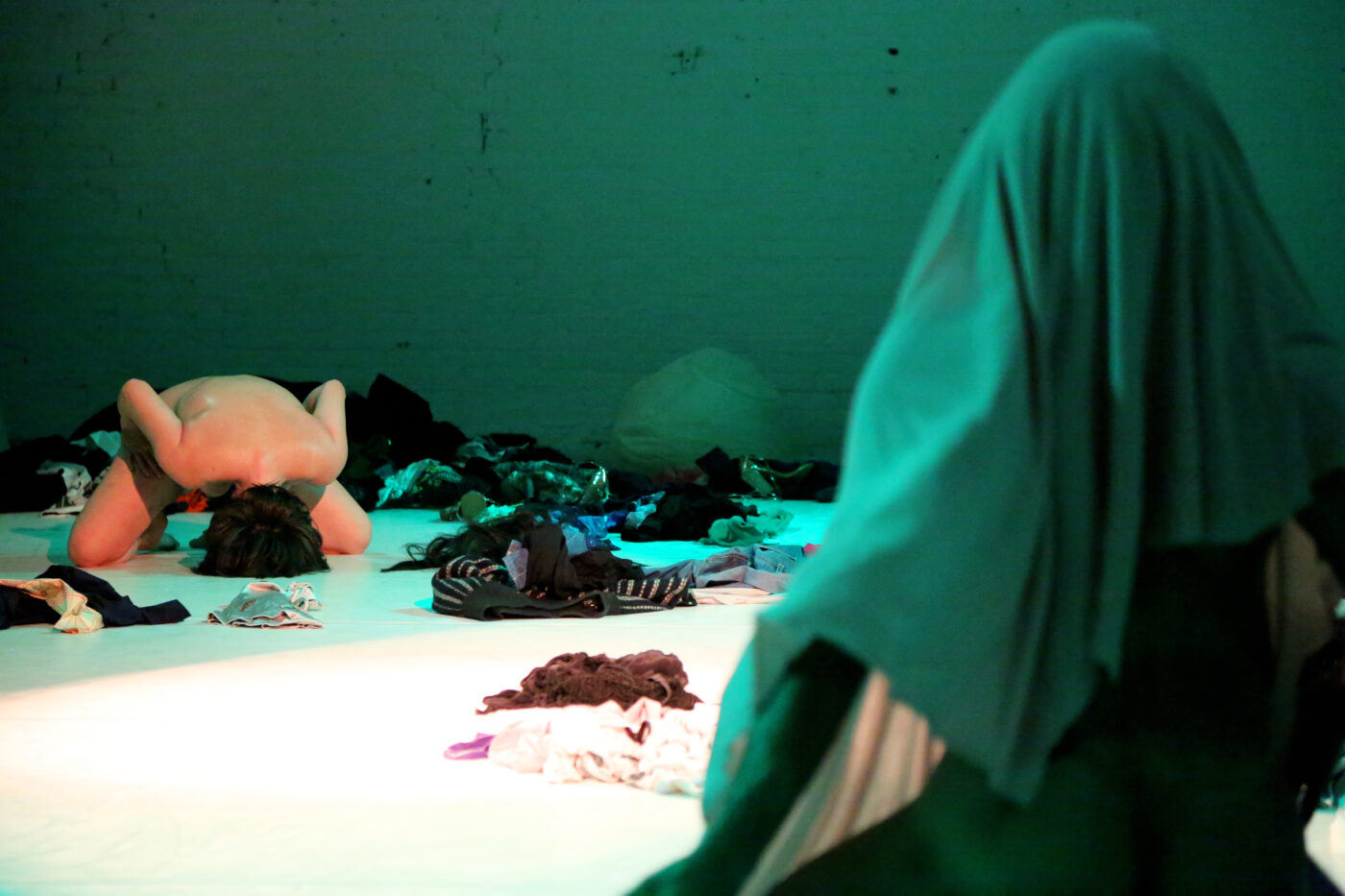
[ID: Photograph of a nude dancer kneeling with their head touching the floor between their legs so their back and shoulders face the camera. The floor is strewn with articles of clothing. In the foreground is a figure with their head and body draped in a green covering.]
“They would do physical contact and physical exercises, and it was all about how you create a performance or a player from instinct, not from your head.”
Marga: I love what you’re saying because it really just brings me back to what I’ve been lucky enough to do as I reopen as a live performer. I’m a supporting actor in this play by Maria Irene Fornés. I learned that dance was one influence in her process, and in the first third of her playwriting, she’d do a three-hour session each time with playwrights. They would do physical contact and physical exercises, and it was all about how you create a performance or a player from instinct, not from your head.
Once this play is over, I go back to what I usually do, which is solo performance. The last show I did was about sexual trauma, but it was also about growing up queer while not knowing you’re queer, and being a horrible little menace in a Catholic school uniform with this other boy. So there’s funny parts, but then there’s also trauma in it. And as a solo performer in a linear, conventional theater presentation, it’s just me. I don’t have onstage contact with anyone else; I don’t touch the audience. When the audience cries and when they laugh, the sound of their reactions, that’s as close to physical touch as I can get in my usual performances.
“I don’t tell the audience how to behave but I’ve done things that are blurry enough so that they feel like they can participate if they want.”
luciana: Even though I make dances, I feel like I make theater, too, because dance is often in the context of the theater, and to me theater is touching in that way. It’s the more metaphoric, emotional touching. I like to be in a place where there’s a blurriness of expectation, where it feels like I’m trying to get people to participate but it’s not clear. I don’t tell the audience how to behave but I’ve done things that are blurry enough so that they feel like they can participate if they want. I like that edge because I don’t want to make something that’s dependent on the participation of the audience, but rather what I’m interested in is to move them in a way, so that if they feel compelled to move, step in, and participate, the show doesn’t fall apart. I’m more interested in them feeling something change in their own state of their body.
It’s like a feeling of liberation or desire. In this last show, a lot of people told me they wanted to get up and dance, and that to me is enough. They don’t need to do it, but just to have that desire or inspiration is more meaningful than actually touching. It’s just interesting that I’ve also had this obsession with what the skin can know, for it to be sensitized by those feelings or to treat it like an animal.
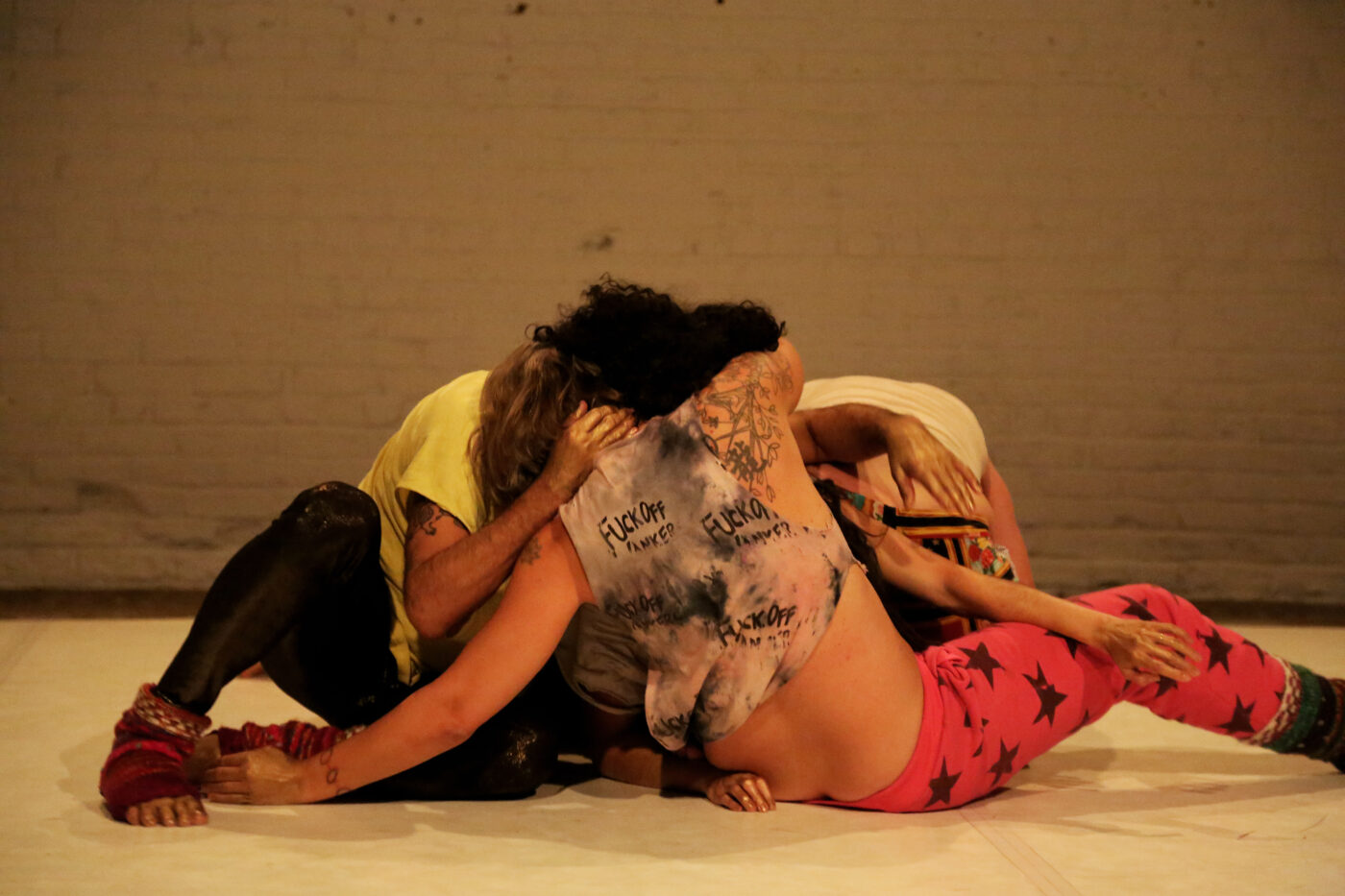
[ID: Photograph of three dancers huddled closely together embracing one another so they almost look like one body with many limbs.]
Marga: Years ago, I’m ashamed to say this because I wasn’t in the moment, but I was doing stand-up comedy, and I was doing a bit about how you can go on the dance floor and dance alone, you know? People don’t need to ask another person to dance with them. You can go and rock out…unless they play a slow song. You never see people dancing alone to a slow song on the dance floor because it makes everybody else nervous. So I played a song and was doing a bit about what that would be like, and this woman just came up from the back, and she was very, very high, and she started dancing with me! So I’m dancing with her and then, I whispered in her ear, “You have to go now.” [laughs] And that’s the opposite of what you’ve just been talking about. But I guess, now, I would just dance with her!
Marga: Because of what I do, it feels a little bit like what you’d expect, you know? The audience has to not interject. Because a lot of people associate me with stand-up comedy, which is a little bit more indirect, but when I do a solo play I do mix in that persona of a stand-up comedian by breaking the fourth wall and looking at people, and then I’ll go and create a scene. But it’s sort of important to everyone’s experience that the audience doesn’t cross the line, doesn’t say things. So when it happens it’s usually disruptive…
Here’s the main thing that really happens: the cellphone. As a storyteller, we use silence to tell parts of a story. We have moments, we take it in, and then somebody’s cellphone goes off or they start scrolling through it. And this is, of course, a phenomenon that has just gotten more out of control in the last 15 years. I started performing before we had cell phones, so this is something I’m getting used to. The weird thing for me is before the pandemic I was a little bit authoritarian about it, and I know sometimes people have an emergency and that’s why their phone is on, but some people are just addicted. Now that I’ve come back, I don’t care what they do with their phones anymore because we’ve been through a shutdown. It does take away from everyone’s experience but I’m just more agreeable about anything, and that’s pretty much where the agreement with me and the audience goes bad, with using devices, otherwise they kind of know what to do.
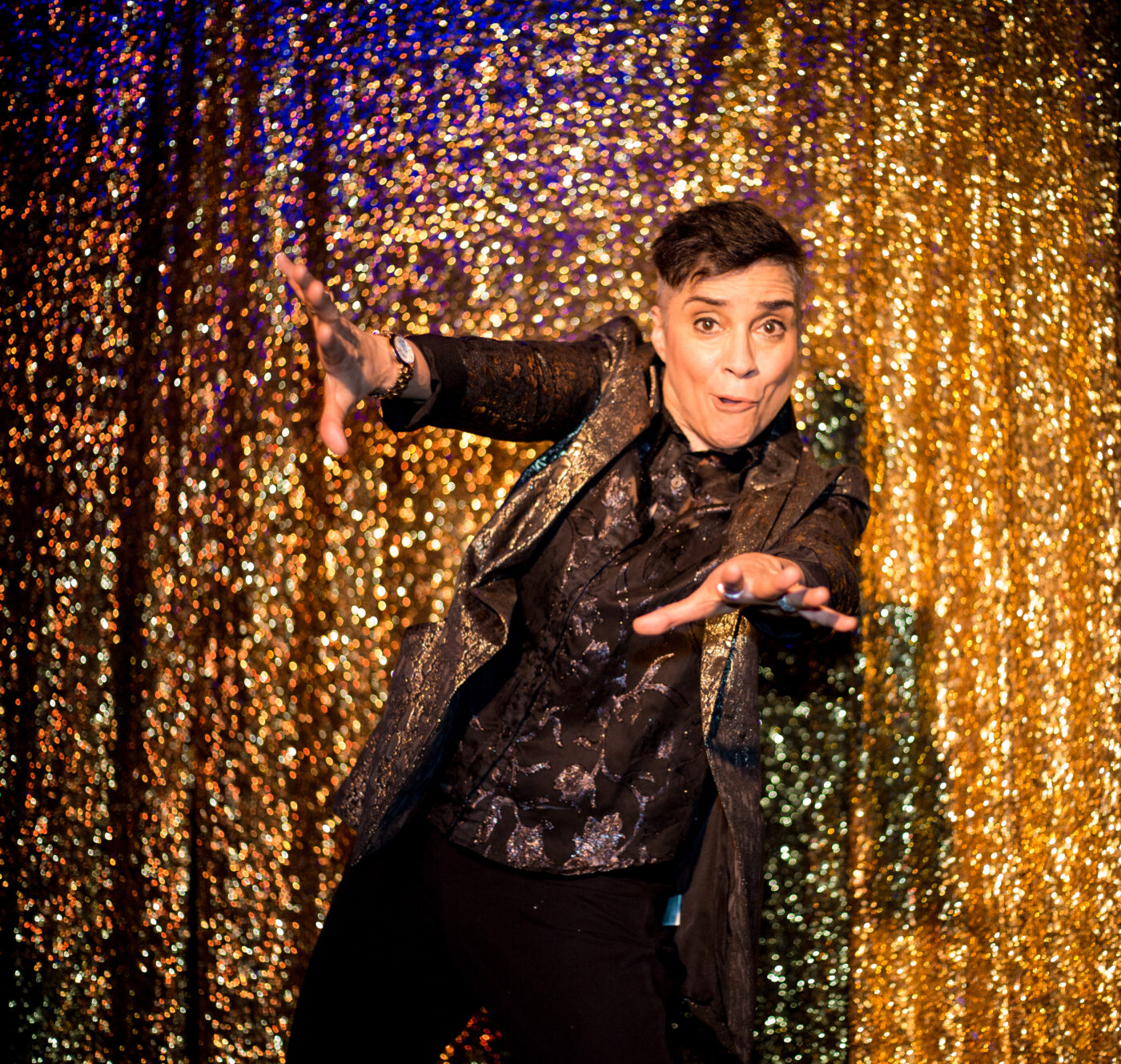
[ID: Marga poses in front of a multi-colored, glittering curtain, leaning to one side with their hands outstretched and their mouth open as in mid-speech. They’re wearing a snazzy patterned suit jacket and shirt.]
I love that people can make sounds with us and everything, but I felt like she was taking it to a place that I didn’t like aesthetically. And that’s what I mean by this kind of blurriness in inviting the audience to participate: to be free, do whatever you want, watch it, make sound.”
luciana: I really resonated with that question in terms of the trust and vulnerability and I felt like it made me curious because I do feel like I leave a lot to chance. There’s a lot that is planned but there is a lot that is unplanned, and there is a level of risk and vulnerability in that. I did a show where there were a lot of planted performers, OTRO TEATRO, where it started as a solo, but then there were twenty-five performers in the audience, and they started to act a little weird. And some people passed papers to these performers saying they should be quiet. The audience started to try to manage these people they felt were “bad” audience members, but they were planned, and they were getting into the practice that I do, which is this Pleasure Practice. So the performers were sighing and looking at me, but then what happens is that some audience member feels like it’s participatory so they start doing things and then sometimes there is a risk because you don’t know how they will participate, what they will feel compelled or allowed to do.
One time we were in Austin for a festival and it was really packed. They added seated cushions at the front and I was doing this part of the solo where I was completely naked and making some sounds. This woman in the front row started making sounds, but she was wearing all these bracelets and started banging them on the floor — I love that people can make sounds with us and everything, but I felt like she was taking it to a place that I didn’t like aesthetically. And that’s what I mean by this kind of blurriness in inviting the audience to participate: to be free, do whatever you want, watch it, make sound. At the same time, some people can take it somewhere else, like with this woman. Eventually, everything was kind of quiet and I was doing something but I remember I stopped what I was doing, I went, kneeled down, put my head on her and told her that she’d have to leave if she didn’t stop soon. I said the same thing you did, and when I got close to her I could tell that she was completely wasted, she smelled like alcohol. I tried to be kind in how I was saying it. But later on in that same performance, a guy took out his phone, and I just grabbed it from him and then I gave it back.
There was another time we were doing this show where someone started singing, but he started singing in his own way, and it was really distracting to me. I remember I was performing and I came up and I yelled at him: “This is your theater, but it’s not your show!” I was pissed I remember —
Marga: That’s the coolest thing I’ve ever heard: “This is your theater, but it’s not your show.”
luciana: — but then I felt bad because he apologized after and —
Marga: He just felt it, right? He was into it.
luciana: Yeah, he was into it, but because he’s such a big presence and he has his own style, he was really changing it. It’s an interesting problem, because I am trying to create a space that feels really free so that people feel like they can be themselves, but yet, when they start to take it somewhere other, I also have my own specific aesthetic, and then it’s like, okay, you can be free up to here [gestures with her arm up to an imagined endpoint and laughs]. I don’t know. I am interested when it’s a little confusing, or how you’ve described, when you were dancing and you made someone feel like they were invited, partly because they were a little high. When it happened to me, it was also someone who wasn’t totally aware or present at the time.
Marga: It’s not just the people with the phones. The woman with the bracelets reminds me of the sound of jewelry. Ugh! My mother used to wear those bracelets all the time, but they are very bad for, you know, for moments in performance. You should take off those bracelets! But a lot of those people always think they’re helping, even the people who start saying things, they wait for you at the end like we did good, didn’t we?
luciana: That’s true.
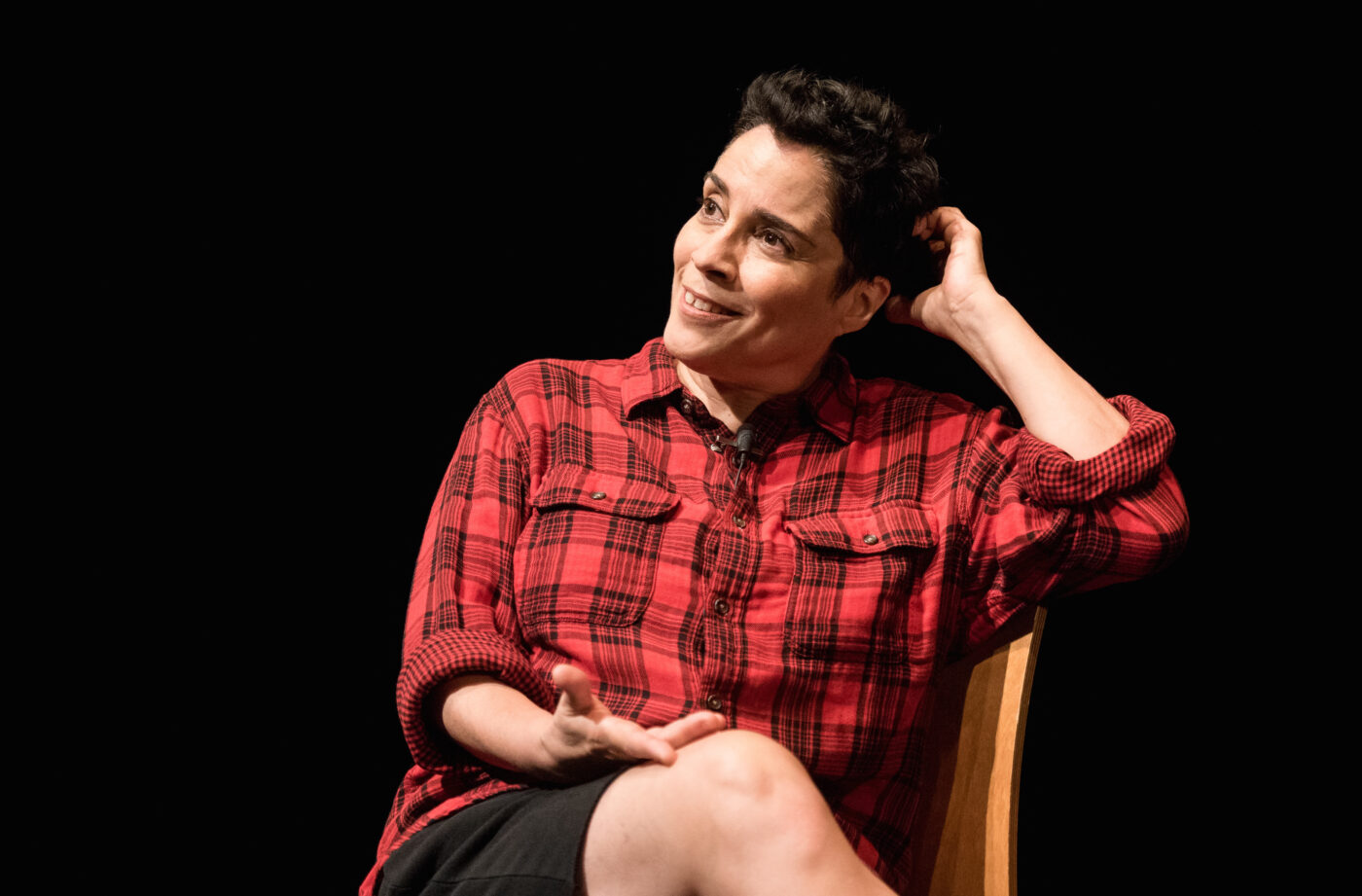
[ID: Marga sits on a dark stage, with their elbow propped up on the back of her chair, and their head resting on their hand. They are wearing a red flannel shirt and smiling.]
“In the past, I had this mindset about control and how the audience has to be, but some of the greatest times in my life have been when I have been forced to improvise.”
Marga: Yeah, I do feel, in listening to you, that I have been more controlling and strict, and I do feel like again after these two years, as long as they’re masked or whatever our safety status is, moving forward, I kind of feel like I could be a little bit more like you.
luciana: Oh, you wanna let go a little bit? Let go of control?
Marga: I think so. I guess for me it’s like, as long as it’s good for the room I don’t mind. I was just very precious about myself and that I felt like I got this focus and attention as the person who brought the show, and now I’m not like that so much. Now it’s like as long as the audience is good with this, that’s okay. If they’re under the influence, though, they probably can’t remain in the room.
luciana: I struggle with this thing as an artist — that to be a really good artist, you have to take your vision to its ultimate realization. There’s this idea that we have to be really controlling of it because that’s the equivalent of mastery, right? But I feel like I’ve done a lot of things where I let go of control, and it’s scary because in a way it seems like, am I just being lazy and scared to really fulfill my vision? When I’m trying to make something, I leave a lot to improvisation…don’t you do that, too?
Marga: In the past, I had this mindset about control and how the audience has to be, but some of the greatest times in my life have been when I have been forced to improvise. I think I’d just be puking before the show if I thought I was going to have to just go with it and say something and then bring it back so that everyone stays in the journey. Now, all I can do is prepare and be inside it, and feel solid with every part of the performance, the story that I’m bringing, and of course, prior to that, how we use sound and lights and all that.
One time I was performing in San Francisco and the audience just started leaving. They started running away and I didn’t know what was happening. There was an earthquake! You couldn’t feel it onstage, you could only feel it on the seats. Not all of them left, though! Some of them stayed with me, and that was like, they’re the best audience ever. And then some of them came back and we finished the show.
Those are times when I feel like I’ve really touched the heavens with art. When there is something so unexpected, when there’s a hole in the ship, or the plane is starting to tailspin, and then you ride it, and you land. I guess that’s the thing: I want to land the plane after whatever detours we have. So if something happens that is contrary to the plan of one of my shows, the audience and I can solve it together.
luciana: Would you say that the aspect of vulnerability and trust in your performance comes through the text, instead of the audience then?
Marga: I have words to get me through to the end, the conclusion, the last moment of this particular story. And so I have to get back to my text because I’m just standing and walking and talking. But there is also a bit of departure from the text when I can check in with the audience kind of like you would in a stand-up routine. That’s why my pieces are a mix of fourth wall and direct address.
luciana: So in that way there is a touch and an intimacy to it.
Marga: I think that’s part of all my solo performances, except maybe for one where I was just all characters and not myself. Normally I am the narrator in these pieces, and I am in the scene and that gives me the opportunity — if something’s happening — to ad lib and be in the moment.
luciana: And also because it’s solo, it seems like you have to kind of riff, even if you have a plan or a text. You’re responding to a feeling because it’s not you with another performer, it’s just you and the audience.
Marga: Yeah, and even if I’m in a scene and it’s fourth wall…one time I had this scene where a drunk friend of mine walked across the stage to get to the bathroom while I was in character as a narcoleptic professor and she said, “Hi, Marga!” And as the professor, I replied, “You are failing.” [laughs]
It should be in everyone’s bag of tricks that you’re flexible. I’m flexible.
luciana: That sounds very flexible, but also a kind of feeling of conversing with the audience, even if it’s a monologue?
Marga: I’m actually in the process of writing a new piece and I think it’s going to be a lot of characters. They can pretty much break, and I’m always ready. Especially now that people have stuck with live performance. I appreciate them more than ever.
I was also thinking that a lot of people have forgotten how to be in community and they’re almost like feral cats. [laughs] So sometimes we have to wrangle the people that have come to see us a little bit. Gently, you know? I’m ready for it. It’s just like a whole new wave.
“Being onstage is a kind of utopian state where I can be completely accepting of myself, all of my parts, and not feel any shame for them.”
luciana: I feel like that came to me instinctually. But I realized as I had to apply for grants and write about my work and explain what I was doing, it was part of what I call decolonizing the body, which feels really trendy now and everybody talks about it, but really stems from the realization that what I’m trying to do is be in this state where I feel shameless. What I was doing wasn’t necessarily a style of dancing, but a way of being onstage that was bodies, beings, that are in a state where they’re decolonized, where there is none of that Catholic, white, or supremacist shame. I also call it becoming uncivilized.
And I loved what Marga said about touching the heavens through art because that’s how I feel when I’m onstage and I feel me and the performers…when we hit that spot when we feel like we’re in a liberated state, where we have no shame in us… and often it ends up being the case that this state is one where we don’t have clothes on, but that wasn’t planned: I don’t tell people they have to take their clothes off, I invite them to do it if they feel like they want to. Only if they feel some pleasure, like [gestures to indicate what she means], oh, I feel my roll, I feel my tit, my crotch, whatever, wherever I’m feeling this state of the pleasure of shamelessly being myself.
I do a lot of therapy now and my therapist told me, “Your work is where you went to heal yourself from all that Catholic shame put on you.” Of having to behave a certain way, of how you’re bad if you’re in your body, and that’s why it goes all the way back to colonization and all it entailed…I often say when I teach: it’s the pooping and fucking self, the animal self, that self that wants to hide in the shadows, all of that stuff that we want to suppress. When we’re onstage it’s an opportunity to put a mirror to people about what we’ve all been hiding and say let’s not hide it. Being onstage is a kind of utopian state where I can be completely accepting of myself, all of my parts, and not feel any shame for them. I think it’s also a call for more of that in society, so that we can heal.
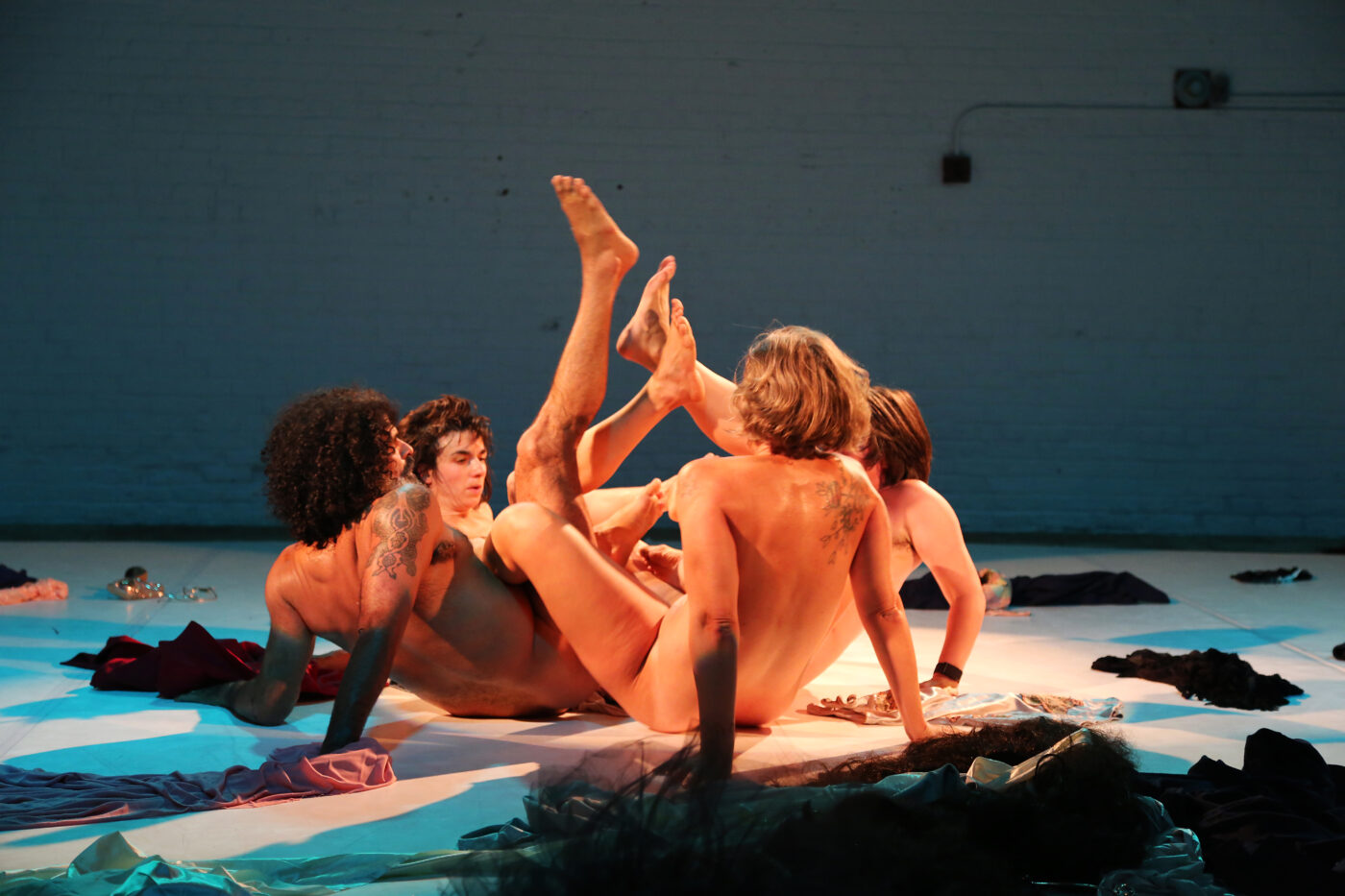
[ID: Photograph of four nude dancers arranged in a circle, facing one another, their legs intertwined. Articles of clothing are strewn on the floor around them.]
Marga: Wow, luciana, I love that. I almost took off my shirt! [laughs] But it would be a whole thing, I’d have to take my headphones off, but the last thing you said just made me realize that I think the only time I’m not full of shame is when I’m onstage. I think the work that I create has always been to solve something that hopefully is not just something that I’m going through. Some of my pieces have been about forgiveness, but in not being able to forgive, there’s shame there, too.
What I still want to grapple with is the shame of being a Latine person who cannot speak Spanish, who allowed myself to be assimilated. I have done some work about that but I still feel I need to do more. I get this little window when I’m onstage and I feel free. I feel like a vessel. I feel like I belong with the people in the room and that what I’m offering might be healing.
I have my therapist appointment in about a half an hour over the phone. She’s been helping me with this because I also have a terrible inferiority complex, which is shame-adjacent. I compare myself to others and I’m embarrassed sometimes, when I’m not performing onstage, where I have all my cool ideas prepared. I’m afraid of public speaking. I was afraid to be here today! I’m a timid mouse sometimes, and I know I didn’t come off like that, but it’s the way I see myself. I don’t know, maybe shame is a fuel to help us be shameless because it’s so debilitating and it’s so imposed upon us by this society that has been controlling us for too long. I do feel that when I can create something that comes out of pain and then find a way to laugh through it, that’s a victory. My work is about being victorious in the end.
“…maybe shame is a fuel to help us be shameless because it’s so debilitating and it’s so imposed upon us by this society that has been controlling us for too long.”
luciana: I love that, and I love when you said this has to do with forgiveness too, because it seems like laughing at yourself, and having people laugh at you in that way, it makes us seem more forgiving or compassionate about those feelings of shame.
I do feel that with the kind of performance I do, I know that when we do it, that there is a healing aspect to it. That is my hope, that every time I do it, I want to get closer to touching the audience in the way we’ve been talking about. Theater thrives on empathy. When people are crying or laughing with you, they’re feeling empathy for the story you’re telling. It’s sort of different with dance, which feels very body-centric, but over the years I’ve become more interested in theater and performance as a healing thing, rather than mastery.
The shame that I often feel is that even though I like beautiful movement, I’ll try to make a beautiful dance and then I end up with these pieces that look very hippie and everyone’s [gestures to indicate what she means] like huh?
With the last piece I made, this review came out after the first night. But for me the first night is usually more like a dress rehearsal —
Marga: Oh, me too! [laughs]
luciana: — and then I’m like, oh, that didn’t work, let’s do it like this instead. Because the audience is there now, I can finally understand.
I compare, too. I feel shame about how my work can look messy. There’s an aesthetic that looks very messy, like we’re just [gestures to indicate what she means] but it’s because it’s about a depth of experience. When I try to make a “good” dance, I’m like, why am I trying to make a “good” dance? Is it to show people that I’m such a “good” choreographer? And then I’ll stop. But in that process I realize I’m not interested in showing off how good of a dance I can make. I make shows about healing and what we need, and the shame of wondering if I can make a good dance. I don’t know. I can also get really nerdy about it, like, oh, the process is about letting go of my ego or I get conceptual about it.
Marga: I think it’s all dance, you know? It’s all good! I remembered a couple of things about this new piece as I was listening to you. I’ve never, never done any movement in any of my solo shows, but because it’s partly about childhood and imagination, last night I decided I’m going to add in a dance. I don’t know how to do it, but I’m just gonna do what I do. And I realized I’m ashamed when I dance, even in a club, because I’m afraid people are going to make fun of me. Because they do! I think I’m dancing so good and then people are like, Marga, you’re so funny! And I’m like…I’m dancing!
And the thing is, my mother was a dancer! She was an Afro-Cuban dancer to begin with, and she danced to make money for acting lessons. She came from Puerto Rico to New York and she wanted to be a Hollywood actress, but her accent cut her out of parts so she didn’t get far. But then she became an exotic dancer. She loved dancing, she was an amazing dancer, and she was very critical of me, even about how I walked. But I think I’ve always been ashamed of how I dance, I’ve been ashamed of how I walk, and that means I have to do it onstage. Just for three minutes.
“There’s an aesthetic that looks very messy, … but it’s because it’s about a depth of experience.”
luciana: That’s great! That’s a healing thing. For me it’s been really healing to put out dances that feel messy because my mom is so perfectly neat about everything.
Marga: Has your mom come to see you?
luciana: Yeah. The last few she hasn’t seen, but I think she gets it. I also know that she likes things that are a little more formal. She does get what I’m doing, but then she’s also like, oh, do you really have to take your clothes off again this time?
Marga: She made that body! She should be proud: “Look what I did!”
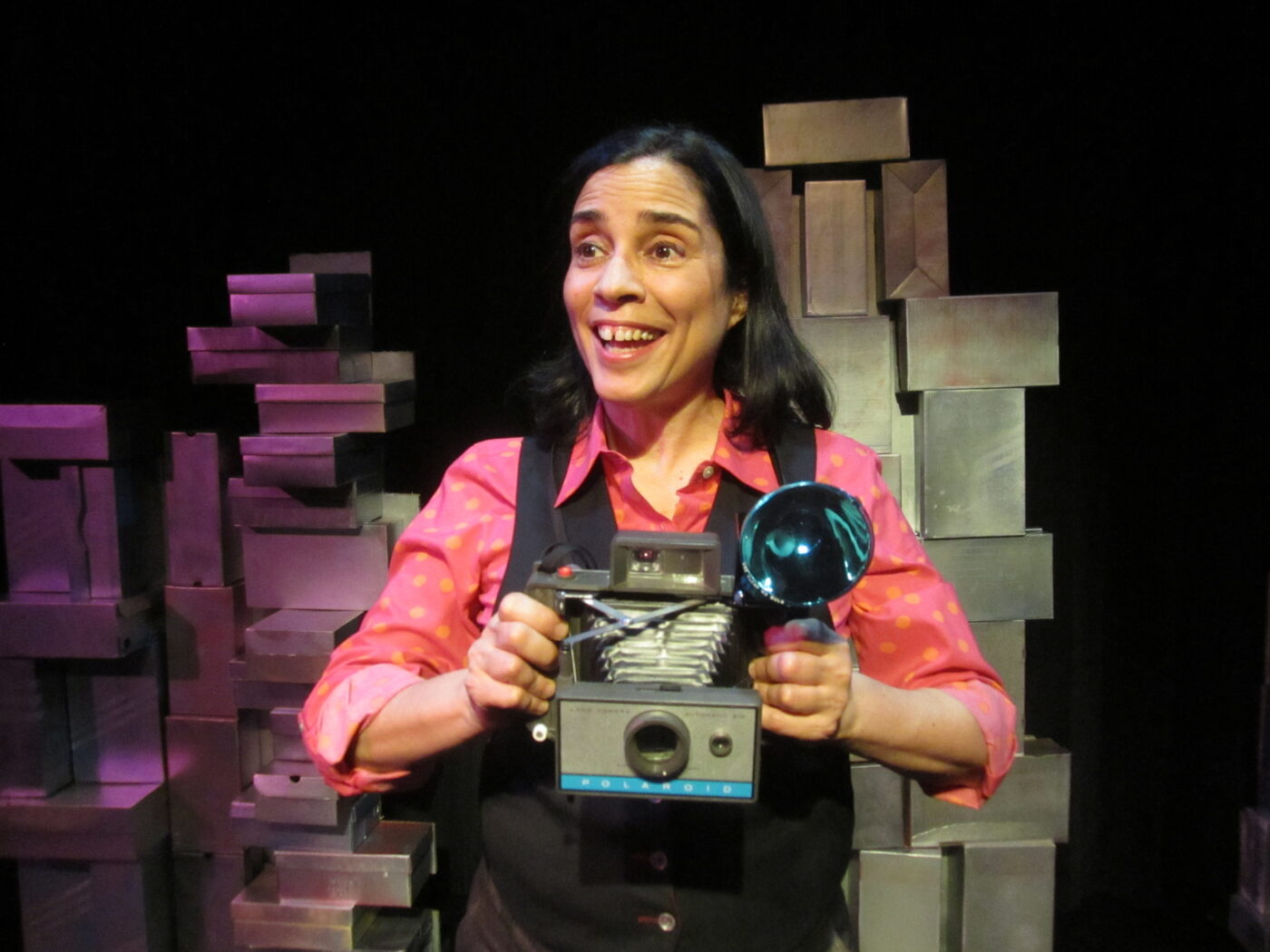
[ID: Marga grins widely on a stage set with metallic boxes stacked in piles. They are holding an old-fashioned camera with a flash and wearing a bright pink shirt with orange polka-dots under a black vest.]
Editor’s Note: An unforeseen technical issue led to a momentary pause in the conversation before picking back up with Marga here.
Marga: Hi! My power went out. I’m back, but I do have to go to therapy (via computer) now. Although I feel like I already had therapy, so thank you. How much do I owe you? [laughs]
Jessica: No way, we’re paying you! [laughs]
luciana: This is the best kind of therapy: you get paid and you get therapy.
Marga: Yes, that is therapy!
luciana: That’s what we were saying when we started rehearsing again after the pandemic. We didn’t realize how much our artmaking was actually a subconscious way of giving ourselves therapy, you know? When you devote yourself to art, it can become a lot about a job or career, too. But during the pandemic it became really apparent that we need it for our mental health. We gravitate towards it. Everything I’m doing in my work is literally what I need to be healthy emotionally, you know? Staying present, not feeling shame, accepting myself.
Marga: We’re making something that is beautiful, ugly, healing, and we’re making it for the community, but when you make it, you’re also partaking in it as well.
luciana: And it’s risky emotionally.
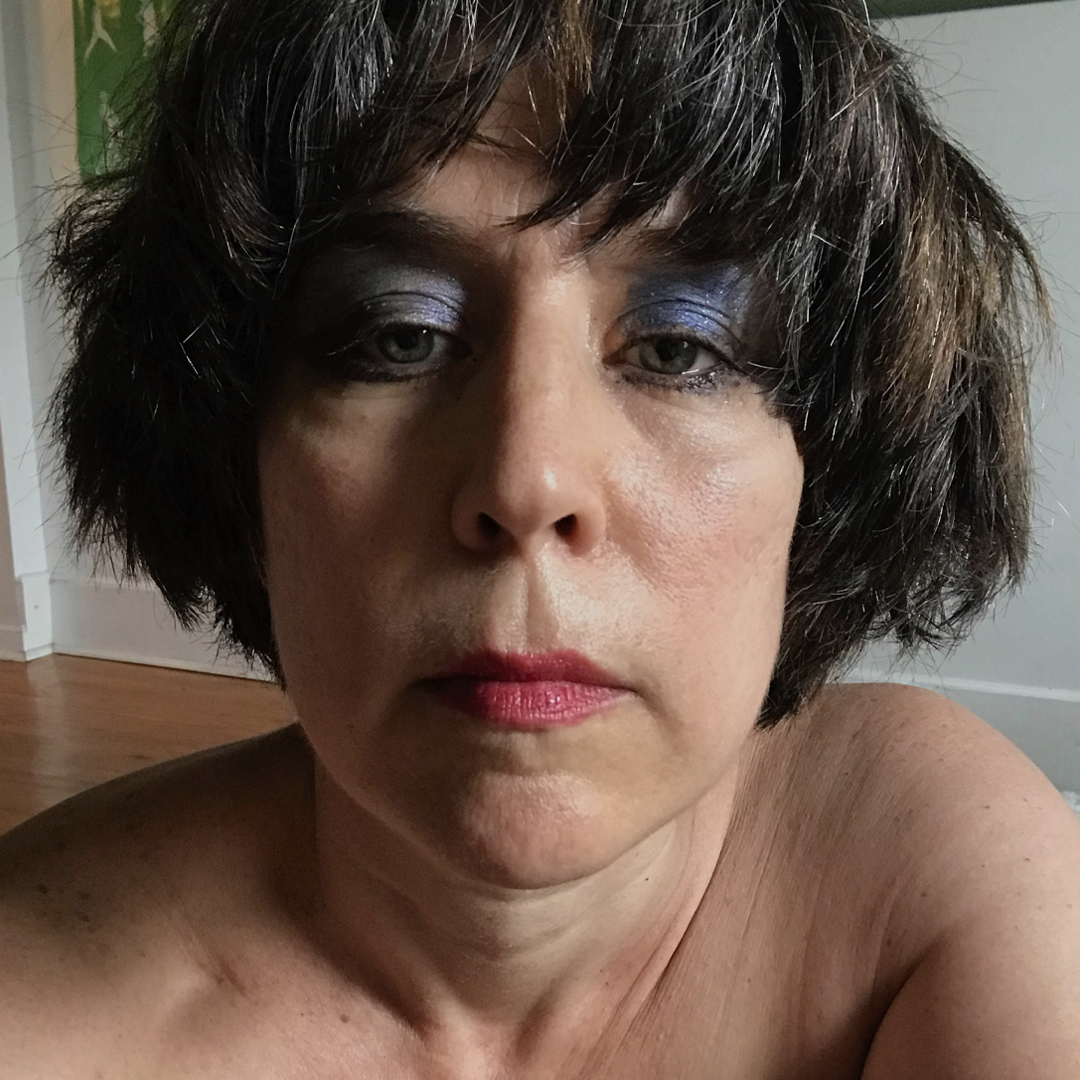
[ID: A headshot of a woman with short, dark brown hair. Her shoulders are bare and she wears blue eyeshadow, coral lipstick, and regards the camera with a neutral expression. ]
luciana achugar
She // Her // Hers
Brooklyn, NY
luciana achugar is a Brooklyn-based choreographer from Uruguay who grew as an artist in close dialogue with the New York and Uruguayan contemporary dance communities, with whom she has been making work independently and collaboratively since 1999. achugar’s work is concerned with the post-colonial world, searching for an undoing of current power structures from the inside out.
Her current work, PURO TEATRO: A Spell for Utopia, began as an online project on Instagram commissioned by and for PICA’s Time-Based Art Festival in the fall of 2020, and premiered as a live performance at The Chocolate Factory Theater co-commissioned by NYU’s Skirball Center for the Performing Arts in November 2021. The Pleasure Project, an ongoing space intervention project, has been seen as guerilla performance in the US and internationally.
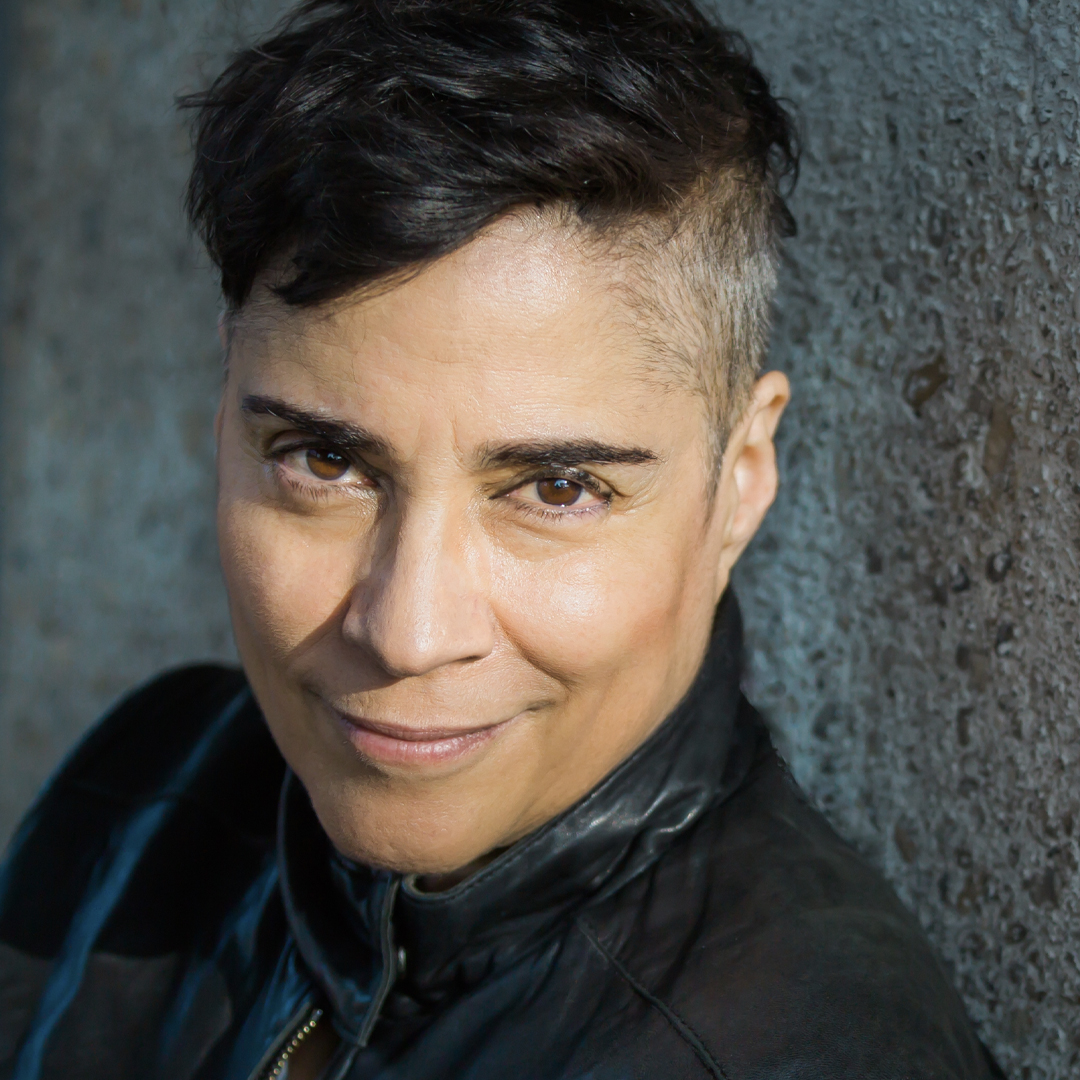
[ID: A headshot of a woman with olive skin and short, dark hair that is cropped close at the sides. She is looking up at the viewer with a small smile. She wears a black leather jacket and stands in front of a grey wall.]
Marga Gomez
She // Her // Hers
They // Them // Their
San Francisco, CA
Marga Gomez is the writer-performer of thirteen solo plays, which have been presented nationally and internationally. Her acting credits include theater roles in the A.C.T. production of Fefu and Her Friends (April 2020), Campo Santos’ production of Translating Selena (January 2020), Off-Broadway Ars Nova’s production of Dr. Rides American Beach House (November 2019), Clubbed Thumb’s virtual premiere of The Woman’s Party (March 2021), as well as roles in Sense8 (Netflix) and Sphere (Warner Brothers). She is currently developing a new piece on gender freedom for a Brava Theater engagement in San Francisco in June 2022. Gomez also produces Latina-centered interviews biweekly on Latina Scream Queens, her YouTube channel.
